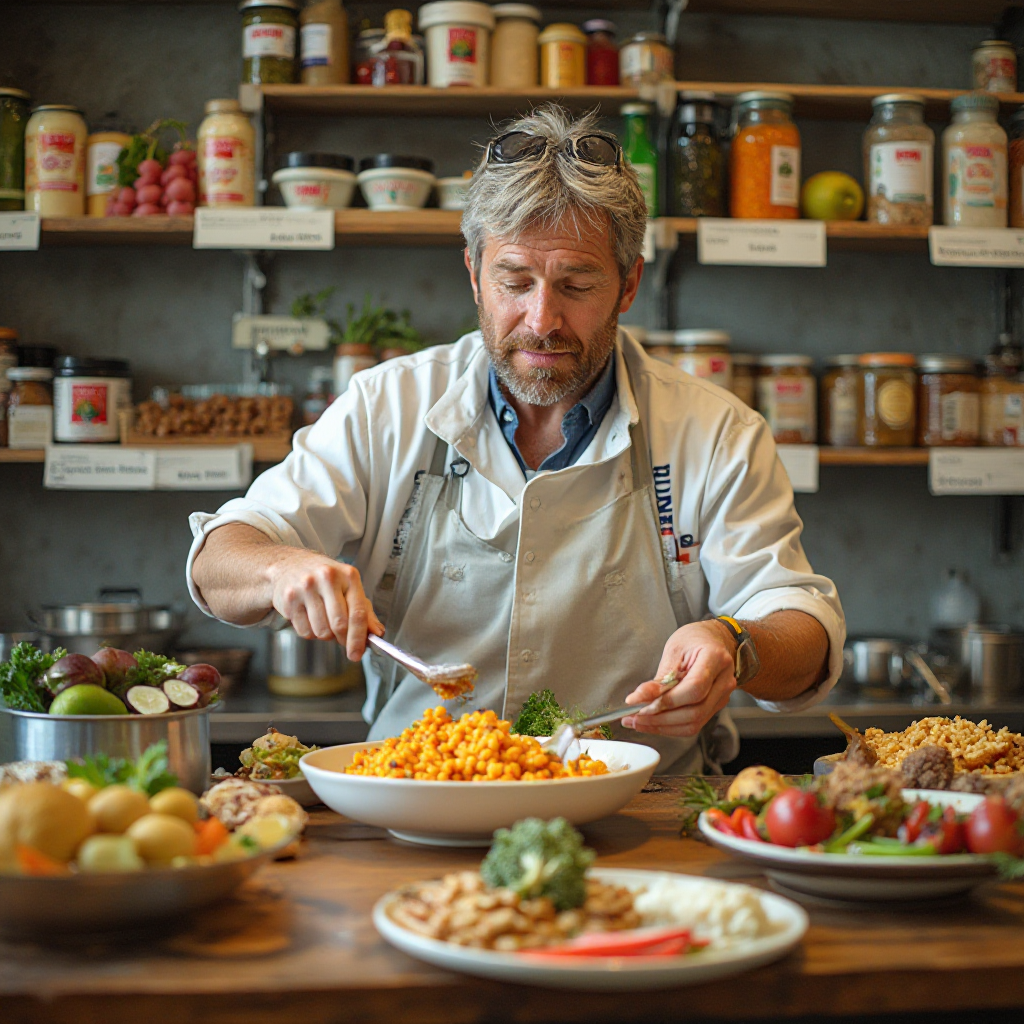Food as Medicine: Crafting the Ultimate Ulcerative Colitis Diet
Food as Medicine: Crafting the Ultimate Ulcerative Colitis Diet
Food as Medicine: Crafting the Ultimate Ulcerative Colitis Diet
Ulcerative colitis is more than just a health issue; it’s a tough thing that can change how you live life. Known by ongoing swelling in the colon, this condition when the body fights itself can cause signs like tummy ache, diarrhea, and tiredness, making every day stuff seem hard.
As folks go on their journey with ulcerative colitis, knowing how food choices affect feeling better is key. The right foods for ulcerative colitis can be a good buddy, changing not just how you feel in your body, but boosting your whole well-being.
Adding foods that fight swelling to your meals can help bring comfort and healing. Thinking wisely about what you eat can cut down on swelling in the gut, ease pain, and help your body get better. In this article, we’ll look into a mix of eats suited for them living with ulcerative colitis, showing the importance of focused eating and good choices. Together, we’ll find the best food plans to power you up on your way to better tummy health and fresh energy. Join us as we look into the world of healthy eats that can change things in your life.
Learning About Ulcerative Colitis
Ulcerative colitis is a long-term gut illness marked by swelling and sores on the inner wall of the colon and rectum. Though the exact reason isn’t known, it’s thought to be a mix of genes, the environment, and the body’s defense system. For lots of people, this condition can feel too much, as it messes with physical well-being and can affect feelings and everyday life. Getting to understand the finer points of ulcerative colitis helps in handling things and making smart food picks.
Normal signs of ulcerative colitis include tummy pain, diarrhea (often with blood or mucus), urgency to use the bathroom, and tiredness. These signs can be worse sometimes and might mess up daily plans. Like, someone having a tough time may find it hard to go to social gatherings or even do routine jobs because of their symptoms popping up without warning. This can cause feelings of being alone and upset, making it key to build a support group and a good ulcerative colitis diet that fits each person.
Living with ulcerative colitis often needs keeping an eye on food and day-to-day choices. Many people find out that some foods make their symptoms worse, while others bring comfort. Adding good bacteria to the diet shows promise for some people by boosting gut health and maybe lowering swelling. But, since each person’s ulcerative colitis is different, what works for one may not do for another. This points to why it’s important to know own triggers and bring in foods that help overall good feeling.
To wrap it up, understanding the meaning, reasons, and signs of ulcerative colitis is a step toward handling it well. With the right knowledge and a positive approach, people can handle the difficult parts of this condition while thinking about food plans like using probiotics—to help healing and enrich life.
How Diet Helps with Ulcerative Colitis
Eating plays a big role in handling ulcerative colitis, as some foods can help ease signs and others might make them worse. By knowing how what we eat affects us, people with ulcerative colitis can act to boost their tummy health. Like, eating food filled with omega-3 fatty acids, like fatty fish such as salmon or flaxseeds, can cut gut swelling and maybe make signs less bad. Also, foods rich in easy-to-dig fiber like oats and bananas can help with digestion and ease diarrhea, making them good parts of an ulcerative colitis diet.
Seeing food as medicine has gotten popular, especially for gut health. This idea gets folks to see food choices as more than just eating but as ways to heal. For instance, turmeric, known to fight swelling, can be simply mixed into meals or taken each day as a pill to help manage symptoms.
You ever thought about how choosing different foods could do for your health and possibly reduce the impact of conditions like ulcerative colitis? This doesn’t solve everything for sure, but it’s worth thinking about, right? There planning good meals and choosing certain foods could be helpful pals in staying well and happy every day.
Adding bone broth to your meals can give you important nutrients and help fix the gut lining, which is great for tummy health. These examples show how some foods can really help manage the condition and make life better overall.
Plus, it’s good to see that everyone’s body feels different about foods: so making the diet fit just right is important. Keeping a food journal can help you see which foods make you feel bad or good, so you can choose wisely. This way of eating changes when needed and can always match your wants and lives. What if everyone thought of food like medicine? People with gut problems can take charge of getting better, leading to a happy gut and feeling good.
Hot topic: Anti-Inflammatory Foods
Getting anti-inflammatory foods into your colitis meal plan can really lift your tummy health and help with symptoms. Foods with omega-3 oils, like fatty fish such as salmon and mackerel, walnuts, and flaxseeds, can calm down inflammation everywhere in the body.
Add in colorful fruits and veggies like berries, spinach, and sweet potatoes are great because they fight harmful stress that might make symptoms worse. Choosing whole grains like quinoa and brown rice give you needed fiber but don’t hurt the tummy much.
The perks of these anti-inflammation foods are beyond just less bother in stomach; they can help heal the guts and offer a sense of well-being. Turmeric, a cool spice with curcumin, has strong anti-inflammatory powers. Try putting it in your dishes to taste better and cut down inflammation from colitis. Ginger in your food too lessens nausea and helps with digestion, giving more comfort.
When cooking anti-inflammatory meals try easy ways to keep taste and food value without bothering your tummy too much. Steam or roast veggies keep there good stuff but are more easy on the stomach. Making soups or blending veggies is a fantastic way to mix anti-inflammatory goodies into one meal — imagine a spinach banana smoothie with a spoonful of flaxseed or a warm veggie soup with turmeric and ginger flavor. Playing with herbs and spices not only taste better but also help health-wise too.
Remember, how foods treat you can be tricky. Keeping a note about foods shows which anti-inflammatory foods gives you flare-ups or not, helping create meals best for your gut health needs. By valuing these foods you can take personal steps to control your condition while munching on yummy and healthy foods.
Spotlight: Probiotics and Gut Health
Probiotics are little microbes that are great for health, especially tummy health, when eaten right. These good bacteria help keep gut balance Theyre a must for people dealing with colitis. When there’s too much bad gut germs it can bring inflammation and make symptoms bad, so having probiotics as a part of your diet plan is good. By keeping healthy gut bugs doing good they help ease up symptoms like diarrhea and stomach hurt therefore aiding healing.
When looking for probiotic foods tips go with fermented picks Yogurt, kefir, sauerkraut, kimchi, and kombucha have probiotics that’s easily in a meal or snack. For those who can’t take dairy or ferment not easy probiotic boosts can help as well. Choosing top choice items with strains helpful for tummy health like Lactobacillus and Bifidobacterium is crucial: talking with a health expert or diet guide could assist in finding whats good for you.
Getting probiotics in diet start slowly and notice what changes they bring. Start with little amounts of fermented foods and watch any symptom difference. What work best for your health might take some doing and switching. Why not try some today and see what changes right?
If you want to try supplements, you should start with a small amount and slowly add it more watching how your stomach reacts. This is a careful idea, and it helps you avoid feeling bad while letting you get the good stuff from probiotics properly. Keep in mind, everyone’s tummy is different, so what works for one person might not work for another; thats why having a personal eat plan might really help with handling ulcerative colitis.
Important Nutrients for Better Healing
When dealing with ulcerative colitis, focusing on main good stuff is super important for helping gut health and making the healing happen. Key vitamins and minerals help lower swelling, boost immune system, and make the gut stronger. For people with ulcerative colitis, making sure to get enough vitamin D, omega-3 fats, zinc, and magnesium is really helpful. These nutrients help less the signs and aid the body’s ability to do better after bad episodes.
Vitamin D gets called the “sunshine vitamin” cause people make it with sun light. But, many folks with ulcerative colitis might have trouble taking this important nutrient cause of gut problems. Adding vitamin D-rich foods like fatty fish (like salmon and mackerel), fortified milk products, and egg yolks in a your ulcerative colitis eating can help improve levels. Also, omega-3 fats, found in flaxseeds, walnuts, and fish oil, are known for helping with not inflaming and can help lessen gut swelling.
Zinc and magnesium are also important for healing guts. Zinc supports the body’s defense and helps fix hurt flesh, while magnesium plays a big part in muscle work and can help less cramping often connected to ulcerative colitis. Foods that got lot’s of zinc include lean meats, shellfish, beans, and seeds.
whereas magnesium pops up in leafy greens, nuts, full grains, and dark chocolate. By putting attention to these healing foods in your food list, you can make a strong nutrition base that not just supports healing but also improves all over health.
Balanced food is key when dealing with ulcerative colitis, it gives the body what it needs to mend.. This means adding a bunch of nutrient-heavy foods while staying away from ones that might trigger something. Working with health pros or food experts in tummies can help you make a personal plan that fits your unique wants and makes sure you’re getting all the good stuff needed for urgent care. Heck, an all-rounded approach to food ain’t just good the tummy but for living healthy too.
Foods To Avoid with ulcerative colitis
Handling ulcerative colitis (UC) often needs knowing what eats can trigger stuff and make things worse. Common guilty ones include high-fiber foods like uncooked fruits and veggies, which can make people feel yuck and puffy when disease gets bad. Also, packed foods full of sugars and bad fats can stir inflammation and worsen tummy troubles.
Dairy eats also often mentioned in triggers cause of lactose intolerance, which ain’t uncommon with UC people. By dumping these baddies,, sick folks can better handle there thing and focus on good-for-you-foods that kick-start healing while energizing body’s to-do.
When considering swap-outs, it’s necessary to explore options that nourish and sooth. For example, instead of raw veggies, cooked or steamed ones are softer on stomachs while still offering vitamins.. Picking low-lactose milk choices, like almond or coconut milk, gives a creamy feel without sick feeling from regular milk., going-for lean meats like chicken or fish, with grains such as quinoa or rice, makes a balanced diet that’s easier on the stomach digestion but full of of nutrients still., maybe you ever thought about spicy food attempts?
Finding personal food issues is key in dealing with ulcerative colitis effectively.. Keeping a diary of eats can be super helpful; by jotting down meals and any following effects, you might start see patterns what show what’s causing the fuss.
This makes way for more personal eating plan with stuff just for someone.. maybe food freedom just a diary away bro?Working with doctors such as dietitians or nutritionists could show you what foods to leave out and suggest good swaps to keep a healthy diet without risking your health, right?
Knowing which foods to avoid is super important for them with ulcerative colitis. By staying away from foods that bugged you and trying good-for-you choices, you might really make life better. And, knowing how to change your eating habits gives you power to pick foods that suit how your body works. Dreaming about this, with careful planning and help from friends, changing your food choices becomes a possible and even exciting road to feeling healthy.
Making Your Own Ulcerative Colitis Food Plan
Making your very own ulcerative colitis food plan could be important for handling your thing well. Begin with a super helpful food notebook to write down what you eat and how you feel later. This could help spot patterns and what makes you feel bad. Say, some with this condition can eat some fiber but might not handle those like beans or whole grains. Getting to know how you handle certain foods lets you pick better food.
Talking with healthcare people, like diet experts or belly doctors, is kinda critical. They could give you clear help and teach you how to eat right for your problems. These friends can help you design a balanced food menu with calming foods, gut-helpers, and key vitamins while dodging bad foods. Keep in mind your eating shouldn’t just stop symptoms but also strengthen your body for feeling good and healthy.
Looking at your feelings regularly plays a key part in tuning your food plan. After trying new foods, see what they do to your belly. Temporary taking out certain eats, then slowly adding them back, might pinpoint bad ones to way better your food plan. Stay open and easy-going as you head through this; finding your right mix might take a bit but it really matters for happiness later.
Mix up foods full of needed vitamins while remembering how your own body behaves forms a base for a winning food plan. As you change meals, think about making dishes with calm stuff, like cooked veggies or little-fat meats, to be easier on your gut. By being part of crafting your food choice and getting professional input, you may step towards managing your colitis and feeling way better day-to-day.
Planning and Cooking Hints
Planning meals for colitis could feel like a big job with tough diet rules. But wait, with a sprinkle of planning and some fun ideas, you can set a meal plan that helps keep your belly happy while satisfying your taste. How about setting some time every week to plan meals focusing on gentle belly foods, like low FODMAP?
You might use a simple list showing what breakfast, lunch, dinner, or snacks you want making it easy to see what’s coming. If shopping is always guesswork, how about making a shopping list? Missing out on bad buys supporting your eating plan are wins alone.
Busy, right? Quick food plans could save the day! Consider making more food, like big pots of soup or stew with calming spices like turmeric and ginger. Freeze portions for later. Or why not try a quick quinoa salad with leafy greens, cool cucumber, with grilled chicken, under 30 minutes? Add a touch of oil, and there’s lunch packed up.
Smoothies can sneak in goodies fast too. Blend a banana with spinach and no-lactose yogurt for breakfast or snack that’s full of yum and easy on your belly. Keep changing and adding different foods are very significant to keep colitis under control.
While it’s smart to stick with foods you know that make your tummy feel okay, don’t be afriad to try new food ideas or ingredients in the low FODMAP plan. Add seasonal fruits and veggies to make food fun like roasted carrots in fall, or fresh berries for summer. Writing down what you eat in a food journal can also help you remember what you eat, tracks what helps make your belly feel good and what don’t, allowing you to make good choices in the future.
Adding these eating planning ideas will not only make cooking more easy, but also give you power over your health. By making meals that fit your needs and likes, you can make a helpful place for healing while enjoying a flavorsome and varied menu.
Homeopathic Medicine For Ulcerative Colitis
Homeopathy offers a whole-body way to dealing with ulcerative colitis, aiming to fix not just symptoms but balance in side the body. Things like Arsenicum album and Mercurius corrosivus are often suggested based on personal symptoms and overall makeup.
These things help by getting the body’s natural fixing ways to work, maybe cut down swelling and helping the digestion feeling better. People find that putting homeopathy together with eating changes like following a low FODMAP diet, can lead to bigger improvements in their condition.
The low FODMAP way, good for fixing tummy troubles, fits alongside homeopathic plans by cutting out things that make ulcerative colitis feel worse. Focus on food that’s simple to digest and skip foods that cause gas, people may have less swelling and belly unhappiness.
This eating way not only helps with dealing symptoms but also fits with the homeopathy ideas—helping the body’s own power to get better while cheering a balanced belly place. Together, these ways make a strong team that gives folks power to get back power over health and make life better.
Empowering Your Journey to Wellness
So, managing ulcerative colitis with the right foods is not only possible but if could make life way better. All through this talk, we see how important food is in easing symptoms and getting better. Everything from eating foods that cool down swelling, having gut-healthy probiotics, knowing good nutrients, and skipping bad foods, each part helps make a special ulcerative colitis diet for you. Think maybe adopting these changes is a step toward good health?
When you start this journey, don’t be careful to ask help from doctors and food experts who can guide and cheer you along. You all can make a meal plan that feeds your body while minding its feelings. Taking charge of whay you hammer can bring better wellness and maybe a brighter view life with ulcerative colitis. What do you think about that?
Discover the Best Foods for Ulcerative Colitis Relief
anti-inflammatory foods, probiotics, gut health, digestive health, personalized diet plan, healing foods, nutrient-rich foods, fiber sources, low FODMAP diet, meal planning,
individuals with ulcerative colitis, caregivers, nutritionists, health coaches, dietitians,










Leave A Comment